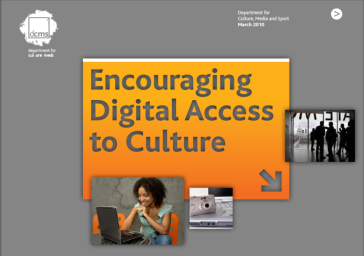 well worth readingThis looks like an interesting document. I've literally just skimmed through it in nanoseconds, but it contains nuggets like:
well worth readingThis looks like an interesting document. I've literally just skimmed through it in nanoseconds, but it contains nuggets like:
A culture of playful, rapid small-scale experimentation needs to be fostered, complementing the desire for quality and integrity which already exists. Inappropriate governance is often stifling innovation and rapid expansion of digital access. Encouraging digital access means a radically different approach to managing technology from the way that large-scale legacy systems have been managed. Technology needs to be better integrated into creative processes.
Hear hear to that! That's exactly what we need in education too: a culture in which experimentation is encouraged, without fear of punishment if it doesn't quite pan out. Obviously there needs to be standards, and kids shouldn't be used as guinea pigs for every new half-baked idea that pops into people's heads. But hasn't it gone too far the other way?
That's what's so refreshing about the projects described in The Amazing Web 2.0 Projects Book (8,895 downloads at least, by the way, as of 5 minutes ago; and that's in just over two weeks!). They are small-scale, and driven by educational aims rather than technological ones. They were experimental; and they were undertaken in a spirit of playfulness.
Read the 10 Essential Things To Do. It's excellent advice, and transfers easily to an educational context.
You can download this free publication from here:
http://www.culture.gov.uk/images/publications/DCMS_Encouraging_Digital_Access_to_Culture.pdf
 It’s amazing what you can achieve with a paintbrush and a fork. Yesterday morning I watched in helpless horror as the lid of something fell down the plug hole in the bathroom sink. I could see it, just about, using the flashlight app on my smartphone (I knew there was more to smartphones than just being connected), but couldn’t reach it.
It’s amazing what you can achieve with a paintbrush and a fork. Yesterday morning I watched in helpless horror as the lid of something fell down the plug hole in the bathroom sink. I could see it, just about, using the flashlight app on my smartphone (I knew there was more to smartphones than just being connected), but couldn’t reach it. It’s amazing what you can achieve with a paintbrush and a fork. Yesterday morning I watched in helpless horror as the lid of something fell down the plug hole in the bathroom sink. I could see it, just about, using the flashlight app on my smartphone (I knew there was more to smartphones than just being connected), but couldn’t reach it.
It’s amazing what you can achieve with a paintbrush and a fork. Yesterday morning I watched in helpless horror as the lid of something fell down the plug hole in the bathroom sink. I could see it, just about, using the flashlight app on my smartphone (I knew there was more to smartphones than just being connected), but couldn’t reach it.
